Text
okay, I think that war wise- Mrs Perry for sure worked somewhere in like a factory and depending on his age Mr Perry went off to the war so maybe he wasn't always like this (PTSD?) I mean it depends on his business i totally forgot what he did as a job but anyways maybe this military like behaviour came from that? OH AND FOR SURE NEIL GOT ALL THE GOOD TRAITS FROM HER (WHAT AN ICON). Also literally all of this info is a fixation of mine lmfaooo
Mrs Perry, the 50s Housewife & Neil
This entire post is inspired by a discord discussion so I can't take all the credit, but Mrs Perry gives off alllll the signals of a 50s housewife reliant on emotional suppression and prescription pills to cope with the demands of post-war society.
'They used barbiturates to aid in sleep, minor tranquilizers to ease anxiety, and amphetamines to help lose weight and boost energy. [...] Women’s pill consumption signals their difficulties, at times, before feminism of the era explicitly touched upon them' - Erin Brown, You Go to My Head: Women's Prescription Pill Use in Postwar America
Her smoking while she waits for Neil to return with Mr Perry from the play suggests a habit to cope with stress. It’s also notable that she hurries to put it out. Is this a further sign she’s smoking to relieve anticipation, or is it something she doesn’t want Neil to see?
And Mr Perry? His treatment of her can partly be explained by patriarchal family structure. What Mr Perry wants, Mr Perry gets. He is head of the family, and takes the lead in family communications with Neil, so much that beneath Mr Perry's repeated use of 'we,' it's difficult to discern how Neil's mother feels.
In the scenes set in the Perry house, we mainly see the family in Mr Perry's study. This direct parallel to Nolan's office INSIDE Neil's home emphasises the rule of authority over his life, and the extent of how trapped he is.
The parallel is important because Nolan's office is shown as a place of punishment for the students, and a reinforcement of their lack of agency.
More specifically, the deleted scenes show school clubs being dictated to the boys as they stand in front of Nolan’s desk. This confirms that school annual - and the editorial position that Neil earned - is taken from him on Mr Perry's whim, just as his whole life is ripped away the next time he stands beside a desk in Mr Perry’s office.
The hurt and betrayal Neil feels in these early scenes is hidden from Nolan, and he submits to the authority of his father. But Neil can no longer hide his hurt by the end. He has gained and then lost too much to accept the stricter controls Mr Perry is imposing.
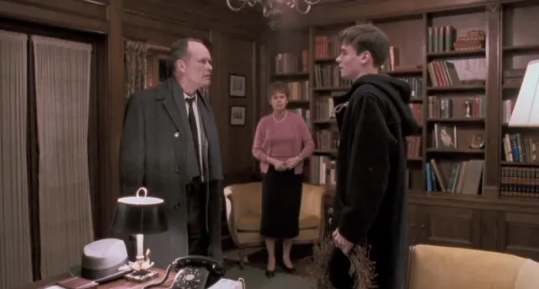

So what does Mrs Perry do when faced with her son's obvious distress? Almost nothing.
Her worry for her son is real, but she shows no true support that Neil can rely on. He looks to her for help and comfort twice. The first time, she looks down, then back at Neil, and says nothing. The second time is after she begins to speak, but her one attempt fails, and she falls back into passivity.
She stands aside. It's as if Mrs Perry isn't really there, stuck behind an invisible boundary observing the damage as the scene unfolds.
It's only when Mr Perry leaves that she provides some fleeting comfort - but this comfort doesn't feel present to Neil. She doesn't articulate her support, doesn't touch him, or make signs that Neil can grasp without doubting her belief in him.


Instead of prioritising her son, she follows Mr Perry without complaint, leaving Neil to grieve alone for the loss of everything he holds dear.
This tiny scene says so much about the dysfunctional family dynamic Neil has been raised in. It's impossible to say when it started, or when his mother stopped advocating for Neil's emotional wellbeing, but there's definitely a bond - however strained - between mother and son that isn't shared with Mr Perry.
As @desire-mona has said, Mr Perry uses his wife and possibly her health to guilt and manipulate Neil into following his demands. There's definitely an argument to made for Mrs Perry having fragile health. If this is physical, or a 'nervous' ailment historically diagnosed in housewives, or a combination of the two isn't clear. Whatever it is, she must not be upset.
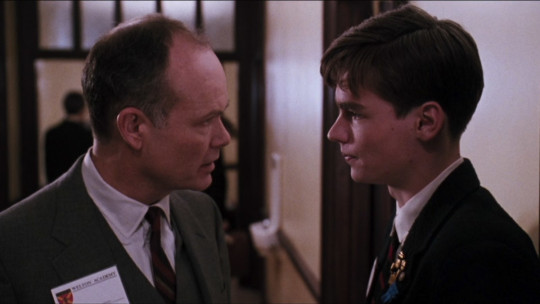

This puts a lot of pressure on a child, and Neil (understandably) complies under the threat. As the above scene implies, Neil is blamed, and likely blames himself, if Mrs Perry's symptoms get worse around the time he disobeys, or just fails to please his parents.
The Perrys different reactions to stress are clearest at the discovery of Neil's death. The shock causes Mr Perry to bypass anger (although anger returns in his search for someone - i.e. Keating - to blame) and his care for Neil surfaces. This is the first time his care is shown through sympathetic emotion rather than demands for Neil to succeed.
Mrs Perry hurtles into denial. Her body is reacting to distress, but she can't comprehend reality. 'He's alright,' she repeats, retreating into a fragile imagined safety to cope.
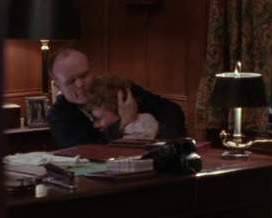
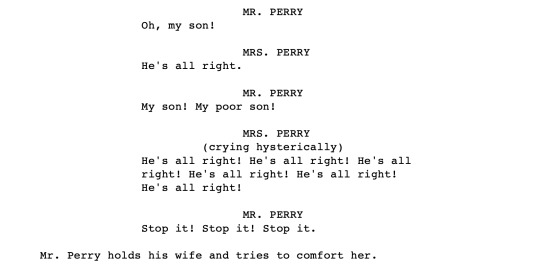
@pencileraser1 has also linked the parallels between Mrs Perry and Neil smoking to the possibility of an inherited mental illness.
Being raised in an emotionally abusive household, and internalising the shame of not conforming to Mr Perry's ideal would be enough to contribute to depression in Neil. But I think both mother and son could share dissatisfaction and a desire for escapism.
When faced with the constraints of the larger system they live under, their mental illness plays out in different ways.
Neil finds a healthier outlet behind the backs of authority through the club, acting, and finding an adult mentor to support him, while Mrs Perry has little to no opportunities to escape the confines of the home or the scrutiny of her community.
Once these opportunities (and coping mechanisms) are taken from him, Neil doesn't turn to smoking, escapist poetry, or other forms of temporary numbing. He's seen his parents suburban lives, seen the life they want for him, and perhaps he can't and won't live in quiet compliance the way Mrs Perry does.
I wonder how Mrs Perry copes afterwards? Does she see a decent therapist? Separate (but not divorce) from Mr Perry? Does she take pills and numb herself further? I don't think I want to know.
48 notes
·
View notes
Text
Omg the charlie one lowkey fits. IDK maybe its because he is a bartender and a saxaphone musican AND MAYBE plays in that bar haha
Professions after DPS ends (non canon)
Todd: English teacher (canon), writer in his free time (my head canon)
Neil: Broadway actor
Charlie: Bartender (I cannot explain this)
Meeks: Therapist
Pitts: Either physics teacher or biomedical engineer
Cameron: Writer
Knox: Lawyer who ends up very unsatisfied with his job and ends up at his parents place
85 notes
·
View notes
Text
Ooh I see where you are coming from! Maybe Mrs Perry came from a 'normal' class and was just thrown into being a housewife (the pressure from her family must have been crazy). I hope my girl read the feminine mystique or something else and realised that she doesn't just belong to him but is her own person (although it would have been diffuclt for her to get out since literally until the 70s she could not get a credit card in her own name). We never know, she may have been incredibly studious and competent when it comes to school and college and had a scholarship, i like to believe she went to some normal college and dropped out to marry him (women often went to college then to find a husband, not to gain education and actually there were more women in college in 20's than 50's so I assume she was one of those who went to college at that time but who knows). This is quite a rant lmao
Mrs Perry, the 50s Housewife & Neil
This entire post is inspired by a discord discussion so I can't take all the credit, but Mrs Perry gives off alllll the signals of a 50s housewife reliant on emotional suppression and prescription pills to cope with the demands of post-war society.
'They used barbiturates to aid in sleep, minor tranquilizers to ease anxiety, and amphetamines to help lose weight and boost energy. [...] Women’s pill consumption signals their difficulties, at times, before feminism of the era explicitly touched upon them' - Erin Brown, You Go to My Head: Women's Prescription Pill Use in Postwar America
Her smoking while she waits for Neil to return with Mr Perry from the play suggests a habit to cope with stress. It’s also notable that she hurries to put it out. Is this a further sign she’s smoking to relieve anticipation, or is it something she doesn’t want Neil to see?
And Mr Perry? His treatment of her can partly be explained by patriarchal family structure. What Mr Perry wants, Mr Perry gets. He is head of the family, and takes the lead in family communications with Neil, so much that beneath Mr Perry's repeated use of 'we,' it's difficult to discern how Neil's mother feels.
In the scenes set in the Perry house, we mainly see the family in Mr Perry's study. This direct parallel to Nolan's office INSIDE Neil's home emphasises the rule of authority over his life, and the extent of how trapped he is.
The parallel is important because Nolan's office is shown as a place of punishment for the students, and a reinforcement of their lack of agency.
More specifically, the deleted scenes show school clubs being dictated to the boys as they stand in front of Nolan’s desk. This confirms that school annual - and the editorial position that Neil earned - is taken from him on Mr Perry's whim, just as his whole life is ripped away the next time he stands beside a desk in Mr Perry’s office.
The hurt and betrayal Neil feels in these early scenes is hidden from Nolan, and he submits to the authority of his father. But Neil can no longer hide his hurt by the end. He has gained and then lost too much to accept the stricter controls Mr Perry is imposing.


So what does Mrs Perry do when faced with her son's obvious distress? Almost nothing.
Her worry for her son is real, but she shows no true support that Neil can rely on. He looks to her for help and comfort twice. The first time, she looks down, then back at Neil, and says nothing. The second time is after she begins to speak, but her one attempt fails, and she falls back into passivity.
She stands aside. It's as if Mrs Perry isn't really there, stuck behind an invisible boundary observing the damage as the scene unfolds.
It's only when Mr Perry leaves that she provides some fleeting comfort - but this comfort doesn't feel present to Neil. She doesn't articulate her support, doesn't touch him, or make signs that Neil can grasp without doubting her belief in him.


Instead of prioritising her son, she follows Mr Perry without complaint, leaving Neil to grieve alone for the loss of everything he holds dear.
This tiny scene says so much about the dysfunctional family dynamic Neil has been raised in. It's impossible to say when it started, or when his mother stopped advocating for Neil's emotional wellbeing, but there's definitely a bond - however strained - between mother and son that isn't shared with Mr Perry.
As @desire-mona has said, Mr Perry uses his wife and possibly her health to guilt and manipulate Neil into following his demands. There's definitely an argument to made for Mrs Perry having fragile health. If this is physical, or a 'nervous' ailment historically diagnosed in housewives, or a combination of the two isn't clear. Whatever it is, she must not be upset.


This puts a lot of pressure on a child, and Neil (understandably) complies under the threat. As the above scene implies, Neil is blamed, and likely blames himself, if Mrs Perry's symptoms get worse around the time he disobeys, or just fails to please his parents.
The Perrys different reactions to stress are clearest at the discovery of Neil's death. The shock causes Mr Perry to bypass anger (although anger returns in his search for someone - i.e. Keating - to blame) and his care for Neil surfaces. This is the first time his care is shown through sympathetic emotion rather than demands for Neil to succeed.
Mrs Perry hurtles into denial. Her body is reacting to distress, but she can't comprehend reality. 'He's alright,' she repeats, retreating into a fragile imagined safety to cope.


@pencileraser1 has also linked the parallels between Mrs Perry and Neil smoking to the possibility of an inherited mental illness.
Being raised in an emotionally abusive household, and internalising the shame of not conforming to Mr Perry's ideal would be enough to contribute to depression in Neil. But I think both mother and son could share dissatisfaction and a desire for escapism.
When faced with the constraints of the larger system they live under, their mental illness plays out in different ways.
Neil finds a healthier outlet behind the backs of authority through the club, acting, and finding an adult mentor to support him, while Mrs Perry has little to no opportunities to escape the confines of the home or the scrutiny of her community.
Once these opportunities (and coping mechanisms) are taken from him, Neil doesn't turn to smoking, escapist poetry, or other forms of temporary numbing. He's seen his parents suburban lives, seen the life they want for him, and perhaps he can't and won't live in quiet compliance the way Mrs Perry does.
I wonder how Mrs Perry copes afterwards? Does she see a decent therapist? Separate (but not divorce) from Mr Perry? Does she take pills and numb herself further? I don't think I want to know.
48 notes
·
View notes
Text
I wonder if she was thrown into being a housewife or did she have some education and left it to become a housewife? If I reread 'The Feminine Mystique' I wonder if I would be able to link it to her??
Mrs Perry, the 50s Housewife & Neil
This entire post is inspired by a discord discussion so I can't take all the credit, but Mrs Perry gives off alllll the signals of a 50s housewife reliant on emotional suppression and prescription pills to cope with the demands of post-war society.
'They used barbiturates to aid in sleep, minor tranquilizers to ease anxiety, and amphetamines to help lose weight and boost energy. [...] Women’s pill consumption signals their difficulties, at times, before feminism of the era explicitly touched upon them' - Erin Brown, You Go to My Head: Women's Prescription Pill Use in Postwar America
Her smoking while she waits for Neil to return with Mr Perry from the play suggests a habit to cope with stress. It’s also notable that she hurries to put it out. Is this a further sign she’s smoking to relieve anticipation, or is it something she doesn’t want Neil to see?
And Mr Perry? His treatment of her can partly be explained by patriarchal family structure. What Mr Perry wants, Mr Perry gets. He is head of the family, and takes the lead in family communications with Neil, so much that beneath Mr Perry's repeated use of 'we,' it's difficult to discern how Neil's mother feels.
In the scenes set in the Perry house, we mainly see the family in Mr Perry's study. This direct parallel to Nolan's office INSIDE Neil's home emphasises the rule of authority over his life, and the extent of how trapped he is.
The parallel is important because Nolan's office is shown as a place of punishment for the students, and a reinforcement of their lack of agency.
More specifically, the deleted scenes show school clubs being dictated to the boys as they stand in front of Nolan’s desk. This confirms that school annual - and the editorial position that Neil earned - is taken from him on Mr Perry's whim, just as his whole life is ripped away the next time he stands beside a desk in Mr Perry’s office.
The hurt and betrayal Neil feels in these early scenes is hidden from Nolan, and he submits to the authority of his father. But Neil can no longer hide his hurt by the end. He has gained and then lost too much to accept the stricter controls Mr Perry is imposing.


So what does Mrs Perry do when faced with her son's obvious distress? Almost nothing.
Her worry for her son is real, but she shows no true support that Neil can rely on. He looks to her for help and comfort twice. The first time, she looks down, then back at Neil, and says nothing. The second time is after she begins to speak, but her one attempt fails, and she falls back into passivity.
She stands aside. It's as if Mrs Perry isn't really there, stuck behind an invisible boundary observing the damage as the scene unfolds.
It's only when Mr Perry leaves that she provides some fleeting comfort - but this comfort doesn't feel present to Neil. She doesn't articulate her support, doesn't touch him, or make signs that Neil can grasp without doubting her belief in him.


Instead of prioritising her son, she follows Mr Perry without complaint, leaving Neil to grieve alone for the loss of everything he holds dear.
This tiny scene says so much about the dysfunctional family dynamic Neil has been raised in. It's impossible to say when it started, or when his mother stopped advocating for Neil's emotional wellbeing, but there's definitely a bond - however strained - between mother and son that isn't shared with Mr Perry.
As @desire-mona has said, Mr Perry uses his wife and possibly her health to guilt and manipulate Neil into following his demands. There's definitely an argument to made for Mrs Perry having fragile health. If this is physical, or a 'nervous' ailment historically diagnosed in housewives, or a combination of the two isn't clear. Whatever it is, she must not be upset.


This puts a lot of pressure on a child, and Neil (understandably) complies under the threat. As the above scene implies, Neil is blamed, and likely blames himself, if Mrs Perry's symptoms get worse around the time he disobeys, or just fails to please his parents.
The Perrys different reactions to stress are clearest at the discovery of Neil's death. The shock causes Mr Perry to bypass anger (although anger returns in his search for someone - i.e. Keating - to blame) and his care for Neil surfaces. This is the first time his care is shown through sympathetic emotion rather than demands for Neil to succeed.
Mrs Perry hurtles into denial. Her body is reacting to distress, but she can't comprehend reality. 'He's alright,' she repeats, retreating into a fragile imagined safety to cope.


@pencileraser1 has also linked the parallels between Mrs Perry and Neil smoking to the possibility of an inherited mental illness.
Being raised in an emotionally abusive household, and internalising the shame of not conforming to Mr Perry's ideal would be enough to contribute to depression in Neil. But I think both mother and son could share dissatisfaction and a desire for escapism.
When faced with the constraints of the larger system they live under, their mental illness plays out in different ways.
Neil finds a healthier outlet behind the backs of authority through the club, acting, and finding an adult mentor to support him, while Mrs Perry has little to no opportunities to escape the confines of the home or the scrutiny of her community.
Once these opportunities (and coping mechanisms) are taken from him, Neil doesn't turn to smoking, escapist poetry, or other forms of temporary numbing. He's seen his parents suburban lives, seen the life they want for him, and perhaps he can't and won't live in quiet compliance the way Mrs Perry does.
I wonder how Mrs Perry copes afterwards? Does she see a decent therapist? Separate (but not divorce) from Mr Perry? Does she take pills and numb herself further? I don't think I want to know.
48 notes
·
View notes
Text
Happy Thigh Man Thursday! (To everyone who celebrates!) Here's Mr. Keating's yearbook page!

"Man Most Likely To Do Anything"
3 notes
·
View notes
Note
could you do Ginny Danbury?
ALSO I LOVE YOUR ART SO MUCH YOURE AWESOME MWAH
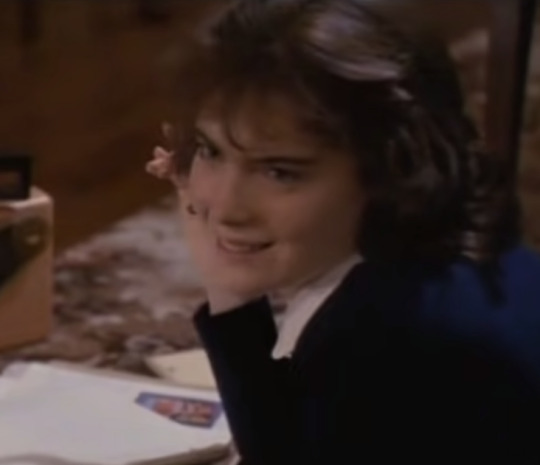


Of course! Thank you so much!! MWAH 🧡🧡🧡
37 notes
·
View notes
Text
the urge to make a playlist now!!
There’s a contemporary jazz group playing now I bet the poets would be THINKING to this music
(Canonically they are from the 50s so I fear Jazz may be their real favorite music)
8 notes
·
View notes
Text
A couple of days (or maybe it was weeks ago my perception of time is so bad) my friend and I did the personality quiz and I got infj. Sigmund Freud I hate you but if you pay me really well you can study me.
#sigmund freud#was such an asshole#his sister feels like such an icon for just being her and proving his theory is not real#psychology#personality quiz#infj
4 notes
·
View notes
Text
THEY WOULD BE SO INTO ARCTIC MONKEYS!
At a college run music festival and I can picture Neil and Todd being on a cute date here watching the bands (we need an anderperry college au)
21 notes
·
View notes
Text
What each poet would do to relax after a study session (AKA things I do)
And yes one of my dear friends will see this and yes I am trying to relax (medieval lit I am coming for you)
Todd- crotchet. He is now my forever crotchet partner (or any craft partner tbh)! He would for sure crotchet things for others and do it whilst he's listening to music or watching a movie. If he has the energy for it he would write as well (more to just write and let himself melt into the pages as he writes in his journal).
Neil- watch movies ESPECIALLY OLD HOLLYWOOD MOVIES. He would see himself performing like James Dean or Humphrey Bogart and then daydream about acting as (TW) Mr Perry barges into his room and tells him off for not revising and 'slacking around'.
Pitts- BAKE BAKE BAKE. Pitts is an amazing baker and I thank that person who came up with that idea every day. He would bake for others and for himself as a way to destress after an intense study session. (I baked some cookies and they looked HORRIBLE but were so lovely!!)
Charlie- go to the student union and play the most random songs that there are on the list. Probably order something from the coffee section or the alcohol section of the bar and shit post, maybe even go to town and play careless whispers lmao
Cameron- He would watch 5 hour video essays on philosophy topics (and yes I did watch a 2 hour video on every political ideology). Probably would yap about it or use it in his future essays!
Knox- go to the beach and mourn and yearn Chris. thats the canon!
#dead poets society#dead poets fandom#dead poets society fandom#dead poets society memes#dps#dps boys#dark academia#dps fandom#dead poets#dead poets society fanfiction#dead poets society x reader#dps fanfiction#dps headcanons#todd anderson#neil perry#charlie dalton#robert sean leonard#ethan hawke#dead poets headcanons#dead poets fanfic#dark acamedia
28 notes
·
View notes
Text
pitts is for sure the avocado!!
without thinking about it too much, which poet is each of my stuffies? <33

19 notes
·
View notes
Text
Todd would HATE Dr Pepper (Im projecting and a Dr Pepper hater <3)
#ill die on this hill#dr pepper#sucks so much#Diet coke for the win#todd anderson#dead poets society#dead poets society fandom#dead poets fandom#dead poets society memes#dps boys#dps#dark academia#dps fandom#dead poets#dead poets society fanfiction#dead poets society headcanons#dead poets society imagines#dps headcanons#dps fanfiction#robert sean leonard
7 notes
·
View notes
Text
MEEEE!!!!!(I literally cannot accept that and refuse to believe otherwise)
one of my hobbies is pretending that certain characters from my favourite films aren't dead. also making playlists (about them)
27 notes
·
View notes
Text
When I watched DPS with my family when I was around 12 my parents told me that Todd was gay and that he had a crush on Neil.. so I believed this to be canonical fact up until I was 19 and watching the movie again for the first time with my college friends and I told them that Todd was gay right as the movie started but by the end we were like hey why didn’t they even mention the fact that Todd’s gay and we googled it and found out it was just a fan theory BUT IT WAS REAL TO ME!!
84 notes
·
View notes
Text
that movie just solved my hyperfixation with 1930's fashion and dancing and made me question so much 🫠🫠🫠
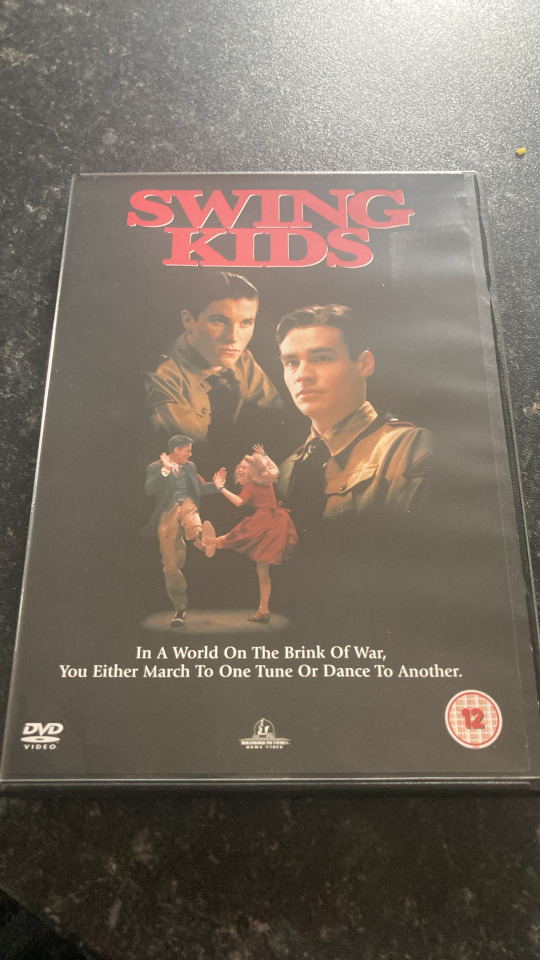
Finally got my hands on a copy of swing kids!
40 notes
·
View notes







